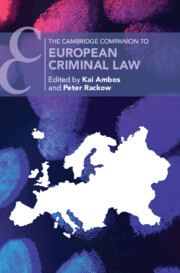Book contents
- The Cambridge Companion to European Criminal Law
- Cambridge Companions to Law
- The Cambridge Companion to European Criminal Law
- Copyright page
- Contents
- Notes on Contributors
- Preface
- Table of Cases
- Abbreviations
- Part I Foundations of European Criminal Law
- Part II Purposes and Principles
- Part III European Substantive Criminal Law
- Part IV European Criminal Procedure
- 10 Fundamental Rights Protection
- 11 Extradition and Surrender
- 12 Further Mutual Legal Assistance
- 13 Police (Operational and Other) Cooperation
- Part V Institutions
- Part VI Perspectives
- Bibliography
- Index
- References
13 - Police (Operational and Other) Cooperation
from Part IV - European Criminal Procedure
Published online by Cambridge University Press: 09 February 2023
- The Cambridge Companion to European Criminal Law
- Cambridge Companions to Law
- The Cambridge Companion to European Criminal Law
- Copyright page
- Contents
- Notes on Contributors
- Preface
- Table of Cases
- Abbreviations
- Part I Foundations of European Criminal Law
- Part II Purposes and Principles
- Part III European Substantive Criminal Law
- Part IV European Criminal Procedure
- 10 Fundamental Rights Protection
- 11 Extradition and Surrender
- 12 Further Mutual Legal Assistance
- 13 Police (Operational and Other) Cooperation
- Part V Institutions
- Part VI Perspectives
- Bibliography
- Index
- References
Summary
The chapter traces the development of police cooperation in Europe from the Napoleonic period to the Second World War and beyond. It shows that police cooperation was shaped to a considerable extent by individual initiatives and also by bilateralism, the latter still having an impact today. Even after the founding of the EU, regional interests or initiatives are decisive. In particular, the Convention implementing the Schengen Agreement, still very important for everyday police cooperation, goes back to an initiative of individual member states. Going beyond bilateral interests and police mentalities, it seems that the very nature of police work is less influenceable by common denominators such as the principle of mutual recognition. Thus, it is not surprising that, for example, the Directive on the European Investigation Order provides, with regard to cross-border covert personal investigations, a provision that does not go beyond its predecessor provisions. The article concludes with a stocktaking of the data exchange of Europes police forces, based in particular on the Schengen Information System. Considering the technical inclination of today’s police practice, the exchange of information will certainly have a decisive effect on any future developments.
Keywords
- Type
- Chapter
- Information
- The Cambridge Companion to European Criminal Law , pp. 306 - 326Publisher: Cambridge University PressPrint publication year: 2023

